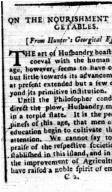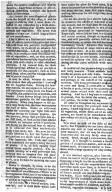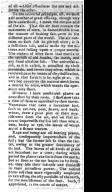[ On the Nourishment of Vegetables ]
Date: 1789/07/01
Source:
Nova Scotia Magazine
Institution: Nova Scotia Archives
| Source Origin: Nova Scotia Newspapers on Microfilm
| Reference: Microfilm Reels 8062, 8063
A discussion of the efficacy of various kinds of fertilizer. nn.11-13. Microfilm Reel 8062.
THE art of Husbandry boasts an origin
coeval with the human race. Its
age, however, seems to have contributed
but little towards its advancement, being
at present extended but a few degrees be-
yond its primitive institution.
Until the Philosopher condescends to
direct the plow, Husbandry must remain
in a torpid state. It is the peculiar hap-
piness of this age, that men of a liberal
education begin to cultivate this art with
attention. We cannot say too much in
praise of the respective societies lately e-
stablished in this island, and in France, for
the improvement of Agriculture. They
have raise a noble spirit of emulation a-
mong the country gentlemen and sensible
farmers. Each seems envious of contri-
buting something towards the general
stock of knowledge.
As I intend the nourishment of plants
to be the subject of this essay, it will be
proper to observe, that I have been di-
rected in my researches by a strict atten-
tion to the analogy that subsists between
animals and vegetables. We know that
neither of them can subsist long without
air and nourishment.
I lay it down as a fundamental maxim,
that all plants receive their principal nou-
rishment from oily particles incorporated
with water, by means of an alkaline salt
or absorbent earth. Till oil is made mis-
cible, it is unable to enter the radical ves-
sels of vegetables; and, on that account,
providence has bountifully supplied all na-
tural soils with chalky or other absorbent
particles. I say natural soils, for those
which has been assisted by art are full of
materials for that purpose; such as lime,
marl, soap, ashes, and the volatile alkaline
salt of putrid dunghills.
It may be asked, whence do natural
soils receive their oily particles? I answer
the air supplies them. During the sum-
mer months the atmosphere is full of pu-
trid exhalations arising from the steam of
dungills, the perspiration of animals, and
smoke. Every shower brings down these
oleaginous particles for the nourishment
of plants. When they happen to fall up-
on a very sandy soil, the solar heat exhales
the most of them. Hence an additional
season for covering our light soils with
herbage during the summer months. On
the contrary, when these particles fall up-
on stiff land, or such as has been marled
or limed, an intimate union is produced,
too strong for the natural heat to resolve.
it is observed that lime mechanically
binds a hot sandy soil. We now see that
it also fertilises it; but the farmer must
not presume too much upon that quality.
The ingenious Mr. Tull, and others
have contended for earth’s being the food
of plants. If so, all soils equally tilled
would prove equally prolific. The in-
creased fertility of a well pulverized soil,
induced him to imagine that the plow
could so minutely divide the particles of
earth, as to fit them for entering the roots
of plants.
Water is thought, by some, to be the
food of vegetables, when in reality it is only
the vehicle of nourishment.--Water is an
heterogeneous fluid, and is no where to be
found pure. It always contains a solution
of animal or vegetable substances.
All rich soils, in a state of nature, con-
tain oil, and in those lands which have
been under the plow for some years, it is
found in proportion to the quantity of pu-
trid dung that has been laid upon them,
making allowance for the crops they have
sustained.
To set this matter in a clearer light, let
us attend to the effects of manures of an
oily nature, and we shall soon be satisfied
that oil, however modified, is one of the
chief things concerned in vegetation. --
Rape-dust, when laid on land is a speedy
and certain manure, though an expensive
one, and will generally answer best on a
limestone land, or where the soil has been
moderately limed. Farmers that live in
the neighbourhood of large towns use a-
bundance of soot. It is an oily manure,
but different from the former, containing
alkaline salt in its own nature, calculated
as well for opening the soil, as for ren-
dering the oily parts miscible with wa-
ter.
It is observed that pigeons dung is a rich
and hasty manure. These animals feed
chiefly on grains and oily seeds. Swines
dung is of a saponaceous and oily nature,
and perhaps is the richest of the animal
manures. The dung of ruminant animals,
as cows and sheep, is preferable to that
of horses at grass, owing to the quantity of
animal juices mixed with their food in
chewing. And here I beg leave to remark
in general, that the fatter the animal, ce-
teris paribus, the richer the dung.
In order to strengthen my argument in
favour of oil being the principal food of
plants, I must beg leave to observe, that
all vegetables, whose seeds are of an oily
nature, are found to be remarkable im-
poverishers of the soil, as hemp, rape, and
flax.
It is usual to talk of the salts of the
earth; but Chymistry has not been able to
discover any salts in land which as not
been manured, tho’ oil may be obtained
from every soil, the very sandy ones ex-
cepted. Marl, though a rich manure, has
no salts. It is thought to contain a small
portion of oleaginous matter, and an ab-
sorbent earth, of a nature similar to lime-
stone, with a large quantity of clay inter-
mixed.
It is a received opinion, that lime en-
riches the land it is laid upon, by means of
supplying a salt fit for the nourishment of
plants; but by all the experiments that
have been made upon lime, it found to
contain no kind of salt. It is the nature
of lime to attract oils and dissolve vegeta-
ble bodies. Upon these principles we may
account for the wonderful effects of lime
in the improvement of black-moor-land.
Moor-earth consists of dissolved, and half-
dissolved, vegetable substances. It is full
of oil--Lime assimilates the one and dis-
solves the other.
To the universal principle, oil, we must
add another of great efficacy, though very
little understood; I mean the nitrous acid
of the air. That the air does contain the
rudiments of nitre, is demonstrable from
the manner of making salt-petre in the
different parts of the world. The air con-
tains no such salt as perfect nitre; it is
a factitious salt, and is made by the ni-
trous acid falling upon a proper matrix.
The makers of nitre form that matrix of
the rubbish of old houses, fat earth, and
any fixed alkaline salt. The universal a-
cid, as it is called, is attracted by these
materials, and forms true nitre, which is
rendered pure by means of crystallization,
and in that form it is brought to us. In
very hot countries the nature earth forms
a matrix for nitre, which makes the oper-
ation very short.
Hitherto I have considered plants as
nourished by their roots. I shall now take
a view of them as nourished by their leaves.
Vegetables that have a succulent leaf,
such as vetches, peas, beans, and buck-
wheat, draw a great part of their nou-
rishment from the air, and on that ac-
count impoverish the soil less than wheat,
oils, barley or rye, the leaves of which
are of a firmer texture.
Rape and hemp are oil bearing plants,
and, consequently impoverishers of the
soil; but the former less so than the lat-
ter, owing to the greater succulency of
its leaf. The leaves of all kinds of grain
are succulent for a time; during which
period the plants take little from the earth;
but as soon as the ear begins to be form-
ed, they lose their softness and diminish
in their attractive power. The radical
fibres are then more vigorously employed
in extracting the oily particles of the earth,
for the nourishment of the seed. Such, I
apprehend, is the course of nature.
Download: Transcription | Images


